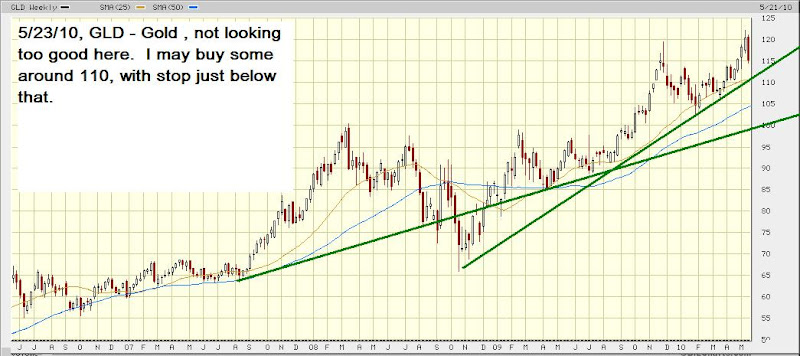General Rant on market issues manifesting on Thursday
Anyone who has the attitude the way to fix wall street is to tax the heck out of them doesn't understand free markets. The JOB of the government (people) is to ensure rules are put into place to create a market place where business is facilitated to not benefit the minority, but yet allow the majority to compete.
There are many things wrong with wall street, but these calls for taxing wall street is just knee jerk reaction by those who are not looking at what is wrong with the "system". To fix anything, the key is to look at the MECHANICS of the system.
The problem that happened Thursday was caused by many things, no one thing is to blame. But it was apparent that the computer trading exasperated what should have been a notable market blip into a out-of-control roller coaster ride.
Specifically about 2% of the market investors account for 60+% of all trading volume. This is done through computers at lightening speed, reacting to information.
This technology needs better definition and process to ensure their participation is not to the benefit of the minority, where the majority have no possible way to compete.
What these computers are doing are placing large volumes of orders, one of the purposes is to detect, or infer, price levels in stocks. By placing large orders "out of the money" and small orders "at the money", the computers can learn at any given second, across the entire marketplace, the strength of the market. Also find out for any given stock more information about price resistance levels.
The goal shouldn't be add taxes and somehow, magically, this will fix wall street issues. All it will do is either be punitive punishment crushing sectors of the financial industry, or drive those participants to new trading techniques.
What happened is the computers started to sell, and in the process discovered there is not enough purchasing volume to hold the market up. This and many other blogs have been saying this for months, that the market is not healthy, and eventually will correct downwards, perhaps for year(s) to come.
What was also discovered is these computers didn't wait to find the best possible price for a security, they instead opted to trade on secondary exchanges to trade shares. They did this since the main trading exchange, (NYSE) started to slow down order transactions to try to gain sanity in the marketplace.
The computers where STARVED for shares to sell to. When their orders where not getting filled by NYSE, they took matters into their own hands and proceeded to trade on the remaining exchanges still responding to orders.
This caused several stocks to go to one penny. The company "Accenture" (ACN) which is normally a 41 dollar stock traded down to a penny on Thursday.
This is not a reflection of the value of the company, nor a reflection on the price demand. It is a reflection that on SECONDARY exchanges there wasn't enough purchasing power to keep the price up. But there may have been huge purchasing power for ACN on the NYSE, that the computers decided it wouldn't wait to sell to.
Most, if not all of these trades where broken starting on Friday, since the trades where not realistic to the marketplace. Therefore no one actually was allowed to "keep" their ACN stock purchased at one penny a share.
In summary,
The Problems
1) Computer involved in "high frequency trading" are buying/selling shares at a huge rate trying to discover price points to gain an advantage in trading. Many of the orders are placed with NO intent on getting executed, but are placed to bully around market participants.
2) Computers decided to not wait to find out pricing from NYSE and traded on secondary exchanges. This caused pricing to fluctuate wildly , not representing the value of the stock.
The Solutions
1) Trades have cost, but currently all cost is when a trade is executed, and none when a trade is placed. If 1/2 the cost was charged when a trade was placed, and 1/2 when executed, this should have a huge impact on High Frequency Trading. Since many orders are placed to "see" price, these market participants are taking advantage of the "free information" for the purpose of financial gain. This is really a loophole in the MECHANICS of trading, and not a "feature" of capitalistic systems to detect fair market value. Placing a billion trades in a week with no intention to get executed will now cost 10+ million dollars. If those companies want to "know" where the stock price has resistance, they should pay for that information for the advantage it gives them.
2) The stock exchanges should have a general status indicator that when flipped, prevent all trading without first checking on the primary exchange. This is just one of I am sure dozen's of ideas on how to ensure secondary exchanges don't replace the primary when the primary exchange isn't trading as fast as the computers would like.
Another idea is you can't trade more than +/- 5% from the last known price from the primary exchange. This would allow secondary exchanges to trade in the even the primary exchange is not responding, but to prevent stocks from varying wildly from their last known price under normal trading conditions.
MECHANICS
Both of these suggestions are fixes to the MECHANICS of trading, and that should be the goal in fixing any business or business process. Throwing a tax as if to say "your industry is too greedy and inept, here is your punishment" does not correct the original fault. That is for the general public (government) to ensure the MECHANICS of business benefits everyone. It is an outright failure of the rule setters and will only allow the problems to grow worse, and to dampen overall business where everyone loses.


































